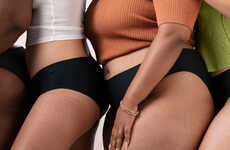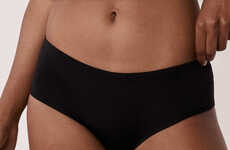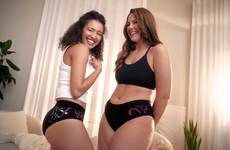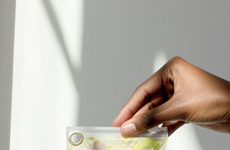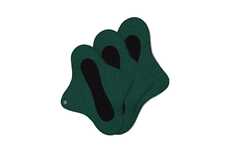
'WUKA Period Wear' Offers a Hygienic Replacement for Tampons
References: wuka & producthunt
Tampons aren't particularly environmentally friendly, producing a large amount of waste, so 'WUKA Period Wear' lets women concerned with the environment have a better option while they're menstruating. The underwear gives women the option to forgo tampons altogether, using a hygienic combination of fabrics to contain wearers' flows while still washing out completely after being worn.
WUKA Period Wear is made from four layers of fabric with anti-bacterial protection. The innermost and outermost layers are made of soft, breathable modal fabric that is just as luxurious as a normal high-end pair of underwear. The central layer is then further divided in two: the layer closer to the wearer is absorbent, holding up to four tampons of blood, while the next layer is a leak-proof material to prevent any spreading.
WUKA Period Wear is made from four layers of fabric with anti-bacterial protection. The innermost and outermost layers are made of soft, breathable modal fabric that is just as luxurious as a normal high-end pair of underwear. The central layer is then further divided in two: the layer closer to the wearer is absorbent, holding up to four tampons of blood, while the next layer is a leak-proof material to prevent any spreading.
Trend Themes
1. Reusable Menstrual Products - The rise of reusable menstrual products like WUKA Period Wear creates opportunities for eco-friendly innovations and alternatives to disposable options.
2. Sustainable Feminine Hygiene - The growing demand for sustainable feminine hygiene products paves the way for disruptive innovations that prioritize environmental consciousness and user comfort.
3. Period Underwear - The emergence of period underwear offers a convenient, hygienic, and reusable alternative to traditional menstrual products, opening avenues for purposeful product design and material innovations.
Industry Implications
1. Eco-friendly Personal Care - The eco-friendly personal care industry can explore the development of innovative, sustainable menstrual products that align with increasing consumer demand for environmentally conscious solutions.
2. Textile Manufacturing - The textile manufacturing industry has an opportunity to experiment with advanced fabrics and materials to create high-performance, functional, and eco-friendly menstrual underwear.
3. Hygienic Apparel - The hygienic apparel industry can tap into the market of period underwear by incorporating features that prioritize comfort, odor control, and effective waste containment.
3
Score
Popularity
Activity
Freshness


